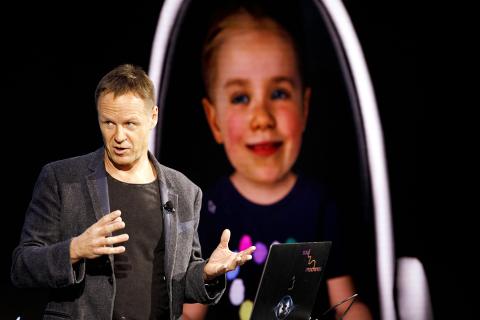Numerous developments in artificial intelligence (AI) were showcased in Taipei on Friday last week, with their developers sharing their vision of the cutting-edge technology that they predict will become more emotionally responsive like humans.
With AI applications such as robots, self-driving cars and automated machinery more pervasive in people’s lives, the technology is to incorporate more human features, Soul Machines Ltd chief business officer Greg Cross said.
“Wouldn’t it be a whole bunch more interesting, wouldn’t these machines be a whole bunch more useful to us, if they were actually more like us?” Cross said at an event focusing on AI development to celebrate Business Week magazine’s 30th anniversary.

Photo: Bloomberg
Cross’ company creates life-like avatars with personality and character and, by “putting a face” on AI, it is opening the door to a new era of human-style customer experience that can be implemented across a wide range of industries, he said.
One of the company’s digital humans, named “Sophie,” incorporates a neural network that combines biologically inspired models of the human brain and sensory networks to create a virtual central nervous system, Cross said.
She is in a trial project with Air New Zealand to answer questions about New Zealand as a tourist destination and the airline’s products and services, Cross said.
LifeBeam Labs founder Omri Yoffe, who is the developer of “Vi,” a voice-activated AI personal trainer that coaches and motivates users through bio-sensing headphones, shared the same concept.
AI technology is meant to inspire humans, Yoffe said, adding that he hopes the voice agent could resemble a true workout companion that brings out the best in people.
“With emotional warmth and companion experiences, we will now be able to trigger people’s minds and help them overcome their motivational barriers,” Yoffe said.
The strength of AI lies in its ability to allow people to interact with each other, said Masa Kawashima, director of Asia-Pacific for Niantic Inc, which wowed the world with Pokemon Go, a free, location-based augmented reality game.
The success of Pokemon Go is a result of AI-boosted technology that encourages people to go outside, explore, be social and stay connected, Kawashima said.
“We want people to share an adventure together,” he said.
Meanwhile, Japanese messaging app operator Line Corp on Friday announced that it plans to expand its services to cover the Internet of Things next year and hopes to find new partners in Taiwan to help with this development.
At the Line Taiwan TechPulse 2017 held in Taipei, attended by more than 700 third-party developers, the messaging company said it hopes to expand the functions and utility of its messaging platform, adding that Taiwan’s strong technology development capabilities and huge talent pool were the reasons behind the event.
Cheng Hung-chia (陳鴻嘉), head of Line’s research and development division, also detailed the company’s upcoming plans for the Internet of Things following the recent introduction of the company’s AI assistant called “Clova.”
Through Clova, Line aims to create a world in which AI seamlessly blends into every device, scenario and environment, he said.

Among the rows of vibrators, rubber torsos and leather harnesses at a Chinese sex toys exhibition in Shanghai this weekend, the beginnings of an artificial intelligence (AI)-driven shift in the industry quietly pulsed. China manufactures about 70 percent of the world’s sex toys, most of it the “hardware” on display at the fair — whether that be technicolor tentacled dildos or hyper-realistic personalized silicone dolls. Yet smart toys have been rising in popularity for some time. Many major European and US brands already offer tech-enhanced products that can enable long-distance love, monitor well-being and even bring people one step closer to

Malaysia’s leader yesterday announced plans to build a massive semiconductor design park, aiming to boost the Southeast Asian nation’s role in the global chip industry. A prominent player in the semiconductor industry for decades, Malaysia accounts for an estimated 13 percent of global back-end manufacturing, according to German tech giant Bosch. Now it wants to go beyond production and emerge as a chip design powerhouse too, Malaysian Prime Minister Anwar Ibrahim said. “I am pleased to announce the largest IC (integrated circuit) Design Park in Southeast Asia, that will house world-class anchor tenants and collaborate with global companies such as Arm [Holdings PLC],”

TRANSFORMATION: Taiwan is now home to the largest Google hardware research and development center outside of the US, thanks to the nation’s economic policies President Tsai Ing-wen (蔡英文) yesterday attended an event marking the opening of Google’s second hardware research and development (R&D) office in Taiwan, which was held at New Taipei City’s Banciao District (板橋). This signals Taiwan’s transformation into the world’s largest Google hardware research and development center outside of the US, validating the nation’s economic policy in the past eight years, she said. The “five plus two” innovative industries policy, “six core strategic industries” initiative and infrastructure projects have grown the national industry and established resilient supply chains that withstood the COVID-19 pandemic, Tsai said. Taiwan has improved investment conditions of the domestic economy

Sales in the retail, and food and beverage sectors last month continued to rise, increasing 0.7 percent and 13.6 percent respectively from a year earlier, setting record highs for the month of March, the Ministry of Economic Affairs said yesterday. Sales in the wholesale sector also grew last month by 4.6 annually, mainly due to the business opportunities for emerging applications related to artificial intelligence (AI) and high-performance computing technologies, the ministry said in a report. The ministry forecast that retail, and food and beverage sales this month would retain their growth momentum as the former would benefit from Tomb Sweeping Day